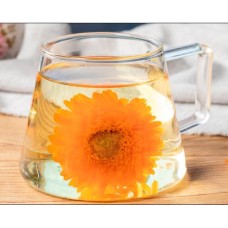Natural Marigold Flower Calendula Officinalis Blossom Herbal Tea
Price: $
Ex Tax: $17.99
Ex Tax: $17.99
Name: Natural Marigold Flower Calendula Officinalis Blossom Herbal Tea
Description: You’ve likely seen brightly orange-colored marigolds in flower or vegetable gardens many times before, but did you know
that certain species of marigold flowers actually have many impressive health benefits as well?
A particular species of marigold flower, Calendula officinalis (commonly just called calendula or “pot marigold”), is used to make
healing herbal ointments, teas, tinctures and topical treatments that have been in existence for almost 1,000 years.
Benefits of Marigolds:
1. Lowers Inflammation and Free Radical Damage
Research shows that calendula’s dozens of active chemicals make it a natural cytotoxic, hepatoprotective and spasmogenic
herb that’s been demonstrated in both animal and human experiments. Extracts taken from the flower have been shown to
lower C-reactive protein and cytokine levels and protect cells from being damaged by free radicals — one of the primary
causes of aging and cell deterioration. Calendula not only controls oxidative damage from free radicals that can affect
delicate tissues, such as those of the eyes, but also defend against infections of the skin, GI tract and genitals caused
by viruses or bacteria.
2. Reduces Eye Inflammation and Conjunctivitis
Findings from animal studies show that calendula extract is capable of treating conjunctivitis and other chronic ocular
inflammatory conditions.
These extracts have demonstrated antibacterial, antiviral, antifungal and immuno-stimulating properties that not only
reduce eye infections, but protect vision by guarding delicate tissues of the eyes from the effects of UV light,
deterioration/aging and oxidative damage.
3. Has Natural Antiseptic Properties
Due to its antifungal properties, calendula can also be used to treat skin infections and jock itch. Applying an ointment
or cream containing marigold/calendula, probiotic “good bacteria” like Lactobacillus sporogenes and lactic acid to the
affected area for four weeks can help decrease symptoms, including pain, itchiness and dryness.
4. Heals Skin Wounds, Burns and Rashes
Historically, and still today, one of the most popular uses of calendula has been applying it to irritated skin (or to the
eyelids and elsewhere) to reduce itchiness, redness, sensitivity, dryness and swelling. It’s been found that calendula has
the ability to promote the growth of healthy new tissue, increase blood flow to the affected area, boost collagen production,
which firms and strengthens skin, hydrate dry skin, and speed up the process of skin repair following surgery or damage.
Marigold’s ability to help treat wounds is believed to be due to stimulation of epithelial cell production, mostly as a result
of the presence of glycoproteins and nucleoproteins. It’s also linked to increased cell turnover and improved collagen metabolism
stimulation. In folklore medicine, marigold products were applied to various ulceration (both internal and external) and wounds to
prevent infections, and even today calendula is used post-surgery to promote faster incision healing.
For those with dry, flaking or rash-prone skin, calendula can be combined with natural lubricating products like coconut oil or shea
butter to improve skin hydration and firmness.
5. Helps Reduce Hemorrhoid Pain
Because marigold treatments can promote tissue healing and reduce swelling, many find that applying it topically to the anal or
genital area helps reduce symptoms of hemorrhoids or anal tears (also called anal fissures).
6. Eases Cramps and Spasms
Calendula’s antispasmodic actions are beneficial for relieving muscle spasms, “charley horse” pains, stomach cramps and PMS/
menstrual cramps. Marigold is able to decrease cramping by improving blood flow to the painful area and lowering inflammatory responses.
* Natural Marigold Flower
* 100% Natural Whole Flowers
* Great for tea or cooking
* Rich in Antioxidents and Polyphenols
* Enjoy nature's refreshment and healing
Dragon Tea House's marigold tea is made from whole, dehydrated marigold blossoms. These delicate yellowish orange flowers make a
fragrant brew that is light-tasting, fruity and low in calories.
Brewing Guide: To prepare the tea, the flowers are steeped in hot water (usually 90 to 95 degrees Celsius after cooling from a boil)
in either a teapot, cup, or glass. Once a pot of tea has been drunk, hot water is typically added again to the flowers in the pot;
this process is often repeated several times.
Write a review
Your Name:Your Review: Note: HTML is not translated!
Rating: Bad Good
Enter the code in the box below:




